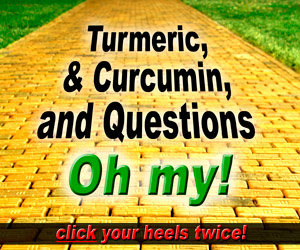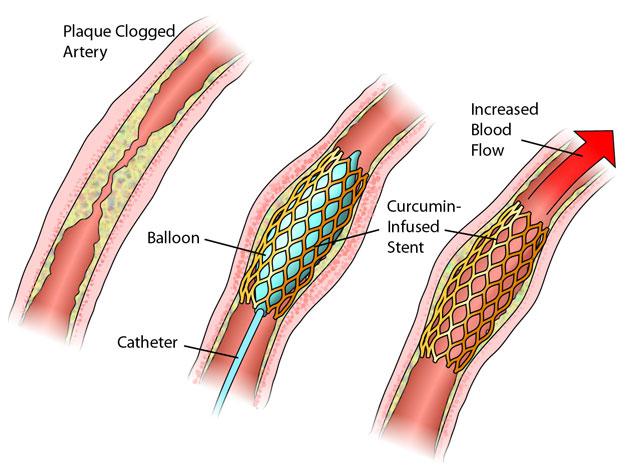On the Cutting Edge - Turmeric for Heart Stents?
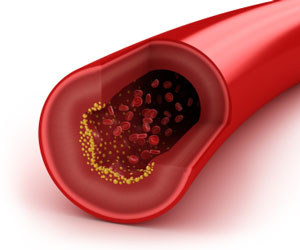
If you have advanced atherosclerosis, it could completely block blood flow in a coronary artery. Doctors may recommend a coronary angioplasty. It's considered less risky than bypass surgery, the another treatment option for advanced coronary artery disease. (vii.247)
As with any surgery, angioplasty is not risk-free. Some people more likely to develop blocked arteries and heart disease (such as those with diabetes) have a greater risk of complications from angioplasty. Stents also don't work well for 10-20% of those who have one inserted, and may sometimes prove dangerous. The good news is that turmeric compounds may help by: (vii.247-248)
- Reducing the chance of needing angioplasty altogether.
- Safely improving the success rate if a stent is necessary.
What is Angioplasty?
The angioplasty is basically done by threading a catheter with a balloon at the end through the arteries to where the blockage is. When the balloon is inflated it pushes the plaque against the artery walls, opening up the artery: (vii.247)
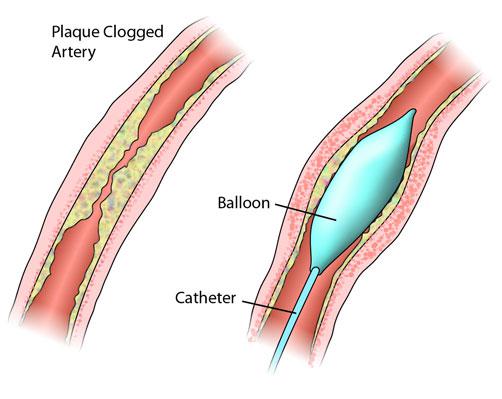
What is a Stent?
Once the artery is opened, a piece of mesh tubing (called a stent) is put in place to hold the artery open: (vii.247)
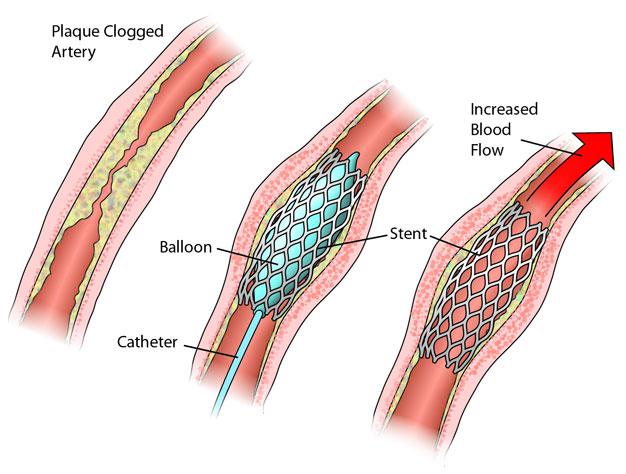
Will Stents Hold the Artery Open Permanently?
Without a stent, angioplasty is at best a temporary solution to a clogged artery in 40% of patients. The artery closes up again and blood flow is blocked - a condition referred to as restenosis. Putting in a stent cuts that rate of failure to 20%. (vii.247)
Medicated stents work best of all, with restenosis occurring in 10% of patients. That's because the medication used helps prevent scar tissue from forming around the stent and narrowing the artery. However, not every patient is a good candidate for a medicated stent. (vii.247)
The Dangers of Stents
You may have heard in the news how stents can be dangerous. Research suggested that stents actually increased the risk of potentially fatal blood clots and heart attacks in people with advanced disease. One study also found that patients with diabetes and/or over age 64 had less risk of complications with bypass surgery than angioplasty and stents. (vii.247, 249)
Angioplasty and stent placement are invasive procedures that trigger the body's normal wound healing process. Further, the metal and the material the coating is made from are foreign to the body. Studies show that in some people stents can chronically trigger the immune system response. The resulting inflammation attracts more inflammatory platelets and artery-clogging proteins to the area where the stent is installed. In some instances, potentially fatal clots form in the stented artery months after insertion. (vii.250-251)
How Can Turmeric Help?
Studies show that turmeric compounds may be able to reduce the risks of angioplasty and stents and improve their success rate in multiple ways:
| Turmeric Compound and Form | Study Results | Take Away Point |
|---|---|---|
|
Curcumin with Cilostazol |
The turmeric compound curcumin significantly increased the response of diabetic rats to cilostazol. This drug is frequently prescribed to people with diabetes in order to prevent and treat cardiovascular disease. (vii.248) Curcumin and cilostazol relax and dilate blood vessels. They have anti-platelet and anti-inflammatory effects. Both also curb adhesion molecules that promote clogged arteries. All of these properties can slow the thickening of walls in arteries in people with type 2 diabetes. (vii.248) |
Turmeric's curcumin compounds could help conventional drugs reduce the need for angioplasty in people at greater risk from the procedure. (vii.248) |
|
Curcumin-Coated Stent |
Curcumin reduced scar tissue around stents by 43-55% in tested animals compared to plain metal stents. The turmeric compound was found to be non-toxic. Results were better at higher doses of the turmeric compound. (vii.252) |
Curcumin-coated stents could safely reduce risk of stent failure. (vii.252) |
|
Curcumin-Impregnated Fiber, Bioresorbable, and Biodegradable Stents |
In lab studies, the turmeric compound improved the inflammatory response to various types of films used to coat stents. Curcumin significantly reduced the accumulation of platelets. It also slowed coagulation, including on the biodegradable PLA film. (vii.250, 253) |
Composite stents made with curcumin could make both biodegradable and non-biodegradable stent materials less likely to cause a dangerous clot. (vii.250, 253) |
|
Demethoxycurcumin |
Demethoxycurcumin is one of three curcuminoid compounds in turmeric. In an animal study, oral administration of this curcuminoid was actually more effective than curcumin in suppressing scar tissue after angioplasty. (vii.254) Encapsulating the curcuminoid tripled its effectiveness against scar-tissue forming cells. The capsules also extended the turmeric compound's release. (vii.255) |
Taking demethoxycurcumin, a curcumin compound in turmeric, could help reduce the risk of restenosis in angioplasty patients. (vii.254) |
Join the 1000s of People Who Are Discovering the Benefits of Turmeric.

Healthceuticals® Turmeric Curcumin Complex
100% Certified
Organic ingredients
- Organic Turmeric Extract - standardized to 95% curcuminoids.
- Organic Whole Turmeric - provides full spectrum antioxidant, anti-inflammatory turmeric benefits, including turmerones and numerous vitamins, minerals, and phytonutrients
- Organic Black Pepper Extract - standardized to 95% piperine; dramatically enhances bioavailablity.
- Organic Phospholipids - markedly improve absorption.
- Organic Ginger - works synergistically with turmeric to provide more powerful benefits.
- Absolutely FREE of potentially harmful additives and fillers such as magnesium stearate.




